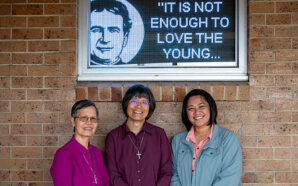“Special Religious Education (SRE) is education in the beliefs and practices of an approved religious persuasion. Under the Education Act 1990, s. 32, government schools allow time for special religious education.”
Each Catholic Diocese in NSW-ACT provides a ministry to students in state schools through groups of volunteer Parish Catechists, who are trained as Special Religious Education (SRE) teachers and assistants, to carry the message to the students in state schools that God is love and Jesus came to bring the Good News and, with our loving heavenly Father, gives us the Holy Spirit to lead the People of God, the Church, into all truth.
Here in the Diocese of Parramatta 1000 volunteer catechists teach Catholic SRE to 15,000 students in 195 primary and secondary government schools in Western Sydney and the Blue Mountains.
Bishop Brian Mascord who has been allocated responsibility by the NSW-ACT bishops for issues associated with SRE wrote:
The Catechists in our Dioceses undertake a vital evangelising role, educating children and young people and forming them in the Catholic faith. For this reason, I draw your attention to the latest statement from the Catholic Conference of Religious Educators in State Schools (CCRESS) who continue to defend the important place and contribution of SRE to Public Education and the choice of parents for their children to be formed in the faith of their family. Please continue to pray for our Catechists and the great work they do for families and our Church.
The Catholic Conference of Religious Educators in State Schools (CCRESS), which is the peak body, has produced a statement in response to recent calls by the NSW Primary Principals Association and the Secondary Principals Council, as well as the NSW Teachers Federation, to remove SRE from the NSW school timetable.
Catholic Church supports SRE in schools
The provision of Special Religious Education (SRE) has been integral to NSW public education since the Public Instruction Act 1880. It was, and remains, an important acknowledgment and reminder that education is centred on the child as a whole person, with family, culture, ethnicity, life experience, faith affiliation and spirituality together defining the character and identity of the child.
Recognising and providing for all these aspects of the child promotes mental health and respects human dignity. Further, Article 29 of the Convention on the Rights of the Child states that our children have a right to an education that respects their cultural identity and affiliation, and includes the development of a sense of responsibility towards others, and respect for cultural diversity. The Australian Curriculum General Capabilities state that students will communicate across cultures, consider and develop multiple perspectives and empathise with others. Certainly, children must know, understand and respect their own cultural identity before they can compare it to others.
At a time when children, for their essential well-being, need connection to their faith and culture like never before, there have been recent, but not new, calls from the NSW Primary Principals Association, the NSW Secondary Principals Council, and the NSW Teachers Federation to remove SRE from Public School timetables, to simplify a crowded curriculum and give the time back to teaching. However, SRE time was never “taken away” from teachers. It has always been an integral part of NSW Public Education.
It is appropriate and right that the NSW Department of Education seeks to streamline curriculum content and ensure that students are getting the best education that can be provided. Indeed, the Catholic Church, along with many other interested parties, is keen to hear about all the content which Principals and Teachers might decide is overcrowding our children’s days at school.
However, no attention should be taken from the learner in the midst of the education process. All parents have the right to choose that their child’s education includes a knowledge and understanding of their faith. It is, after all, this connection to their faith and culture that guides ethical and moral choices. It forms an awareness of and respect for all cultures, as they see their buddies go off to their SRE or SEE class, and promotes harmony in the community. Classroom teachers who have developed a relationship with their students know that unless they are “seeing” the whole child, they are not teaching the whole child, nor is the child learning to capacity.
The Catholic Church supports parent/carer choice of SRE in class time for the thousands of Catholic families that send their children to public schools in NSW and call to both sides of politics to support the legislated right of parent/carers to continue to choose SRE as part of their children’s public school education.
For further information contact Cecilia Zammit, Director for CCD, Diocese of Parramatta Cecilia.zammit@parracatholic.org or 02 8838 486.








